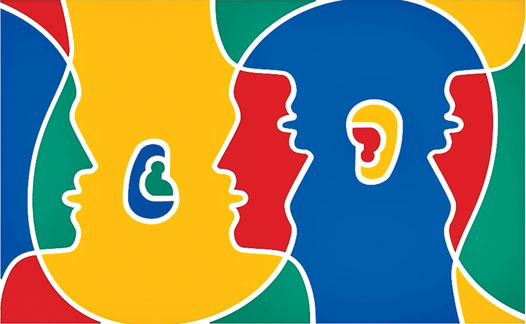The silent battle of languages
By Padma Edirisinghe
England has been declared the winner. No less a person than a
foremost statesman of ours recently declared that England has achieved
the status of initiator of WORLD LANGUAGE, a status many an upcoming
nation would aspire to attain. How did this happen?
 Most would attribute it to the corresponding power the Isles achieved
in the race for grabbing other people's land. Of course, the Iberian
races stood first in the race, but Britain soon surpassed them weaving
their power mostly around the Indian sub-continent. Here too the Dutch
had established their VOC or the Dutch East India Company before the
British, but by a ring of Forts put up in the major cities mostly by the
sea, the British East India Company outdid them. Most would attribute it to the corresponding power the Isles achieved
in the race for grabbing other people's land. Of course, the Iberian
races stood first in the race, but Britain soon surpassed them weaving
their power mostly around the Indian sub-continent. Here too the Dutch
had established their VOC or the Dutch East India Company before the
British, but by a ring of Forts put up in the major cities mostly by the
sea, the British East India Company outdid them.
Imperialism
Some pundits quip, the glorious British Empire in India was put up by
a business company that the kings and queens of England had ignored at
the beginning.
Imperialism
is not condoned here, but facts have to be presented. Around these
Forts, as Madras and Bombay grew pockets of British culture, the English
language found them fine breeding places for entrenchment.
Meanwhile, a little island, which some compare to a teardrop or a
pearl, hung beneath India and a replica of this drama took place here
too. (Who can evade universal currents?) Accordingly, as early as 1833,
a gentleman named Colebrook, accompanied by one Cameron, suggested that
the medium of all schools in Ceylon (as it was then called) should be
English. But, mainly due to the lack of teachers (and not due to any
national sentiment) this proposal was not carried out by the then ruling
body, the Legislative Council that preceded the State Council.
Did the propagation of the English language stop with this? No. In
fact the missionaries began to have their field day. Armed with staff
who had mastered the English language, and equipped with appropriate
buildings in major towns, English education began to flourish in these
schools and were well patronized by the rich and the powerful, thus
heightening the social class division.
Visionaries
It took many more years and visionaries such as CWW Kannangara to
bridge the widening gap by establishing what came to be known as Central
schools, which paradoxically were national schools, adopting English as
the main medium. Soon, English education spread throughout the island
with even the University medium established as English. One would expect
the native mediums to be crushed under the winner. But it did not.
What happened in Mesoamerica did not happen here. There, under the
brutal shoes of the Spanish and Portuguese the local languages fled,
despite heroic efforts by a few patriots to retain them. The battle of
the languages was fought more favourably towards the invaders. However,
Ceylon and India fared better due to intense national movements.
But, all is not well. We have lost much of the nuances and the
idiomatic expressions in the process of the transition. It can be dubbed
almost piquant, but much of the upcoming generations lost touch with
them due to being misled as 'sophistication'.
The other day, I had this conversation with my niece who had just
rebuked a relative for using the form of address "Yakko!"
'Yakko is not a dirty word. It is, say, an elemental word, a word we
use when we are in doubt or in a flurry".
Another person joining in said, "The yakkos have come down history
with the Sinhalas for generations, so that some have coined little
stories and catchy praises around them. These are the mysteries of
languages. No one can introduce them from outside. They spring from
within."
Native
"Yes. There are many words of that calibre in the Sinhala language
and nobody needs battle with them. In fact, doing away with such piquant
native words is like destroying the very essence of the native
language.'
"For example, the saying, Yana yaka korahath bindagena yanawa vagey,
meaning, intensifying the pandemonium on one's exit".
"What is koraha?" the niece wished to know.
"It is a kitchen vessel supposed to be made with clay, but now made
with aluminium. Yet, the word koraha remains".
"Is it a language battle?"
"No. It is language retention like anora wehi. Anora means heavy
showers, and mostara means patterns and nona is lady, which are all
Portuguese words."
"Heavens! Not words brought by the yakkos?"
"No. We have more than 1,000 words taken from the Portuguese, who
once ruled us. In fact, the game, 'Come come burro', is coined from a
Portuguese usage, which is a summons to a donkey or booruwa. Though the
booruwas were later deported to Delft, the young took to the booru game
avidly, while camp beds too began to be called booru beds for no
apparent reason."
"No language battle here?"
"No. Language camaraderie, resulting from many factors including
musical resonance." |

